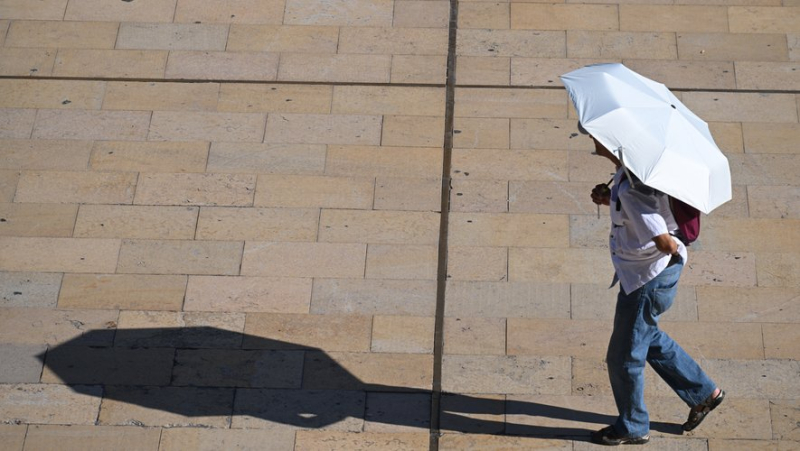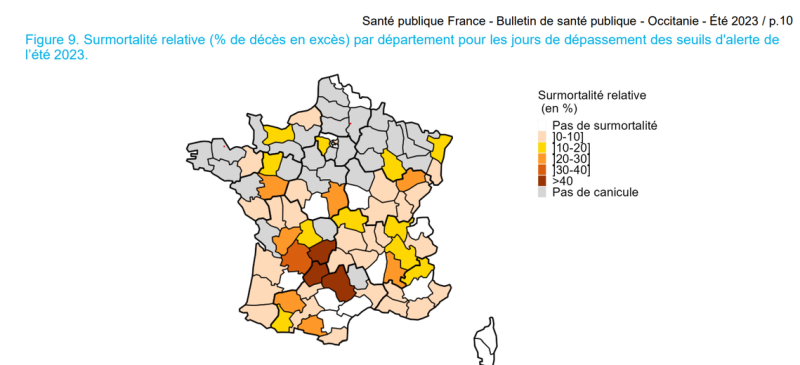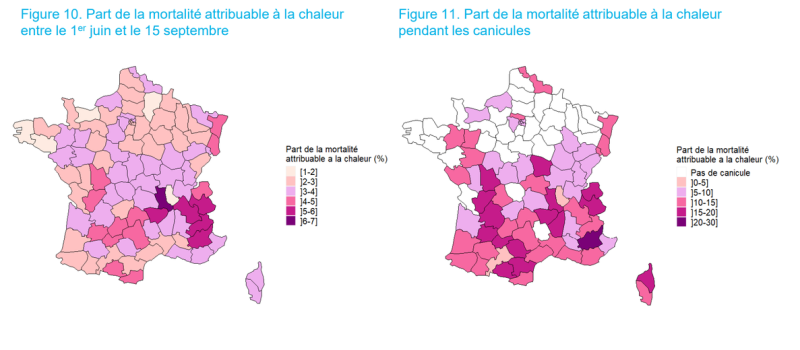Heat killed more than 5,000 people in France from June to September 2023, the fourth hottest summer of the 20th century

L'été 2023 est le quatrième été le plus chaud depuis le début du 20e siècle. Midi Libre – JEAN MICHEL MART
Public Health France released this Thursday, February 8, the results of a study on the health impact of the four heatwave episodes in the summer of 2023 in France: more than 5,000 deaths. 11% of deaths are attributable to heat. Those over 75 are on the front line. In Occitania, two episodes of extreme heat were recorded, with a toll of 524 deaths.
"The risk linked to heat is still little perceived in the general population, but in a context of global warming, with heat episodes which will multiply and amplify, we must reinforce the messages of prevention " : this is the conclusion of Stéphane Denys, director "health and environment" to Public Health France (SPF), in view of the study of the impact of the heatwave on the health of the French and mortality, published this Thursday, February 8.
What does the study say ? That the summer of 2023, the fourth hottest summer since 1900, was crossed, in France, by four heatwave episodes which affected 73% of the population, two in July, one in August, and "an unprecedented one in September", specifies Guillaume Boulanger , who analyzed the data in a press conference.
Characterized by "at least three days with an average temperature measured by Météo France exceeding the alert thresholds", these episodes caused & ;quot;5,000 additional deaths over the period from June 1 to September 15, "3.1% of deaths, from all causes, are attributable to heat". Those over 75 (3772 deaths) and the south-eastern quarter of France "are the most affected".
Outside of these extreme episodes, SPF estimates that "11% of deaths are attributable to heat" during last summer.
In Occitania, "524 deaths attributable to heat"
The situation varies depending on the region: "In Occitanie, an overall excess of +75 deaths , + 4%, was estimated for all the heatwave episodes that impacted our region", one in the second half of July and one in the second half of August. The significant excess mortality recorded during the August heatwave (+94 deaths, or +7%) is offset by “a lower number of deaths during the summer. heatwave episode of July", – 19 deaths compared to forecasts.
In total, "524 deaths are attributed to the heat over the period", and "3152 deaths if we consider the last seven summers including 1015 during heatwave periods specifically".

Different situations depending on the region. PUBLIC HEALTH FRANCE
From one department to another, the figures differ greatly: + 55% deaths in Lot (+ 23 deaths), + 41% in Aveyron (+ 28 deaths ), + 28% in Gers (+ 14 deaths) and + 28% in Ariège (+ 12 deaths).
Always according to SPF, "68 SOS Médecins acts for the iCanicule indicator were recorded regionally as well as 391 visits to the emergency room".

Mortality attributable to heat by region. PUBLIC HEALTH FRANCE
Twice as many trips to the emergency room
Absolute temperature records were recorded at Serralongue, in the Pyrénées-Orientales, with 40.4°C on July 18, at 700 meters above sea level, and in August , in Carcassonne (43.2°C) and in Montauban (42.6°C).
Beyond deaths, the health impact of high heat is measured in health services: "Emergencies, with 16,000 visits , having led to 10,000 hospitalizations, saw their visits multiplied by 2.1, particularly for hyperthermia, and the number of SOS Médecins consultations was multiplied by three", explains Guillaume& ;nbsp;Baker.
One indicator, however, remains "undervalued": "11 accidents of work are attributed to heat, they are underestimated, it is difficult to measure the burden linked to heat in the workplace".  ;
And the study does not allow "to bring up the specific figures on the surveillance of nursing homes, we have biased statistics, specifies SPF.



